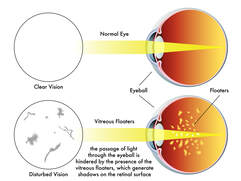What is an eye floater?An eye floater may look like a small spot, squiggly lines, or cobwebs that move or drift in your line of vision. If you try to focus on the floater, it may seem to move out of sight. Usually, floaters become most noticeable when you look at a bright plain background, such as a light-colored wall. CausesTypically, eye floaters occur due to natural physiological changes inside the eye that occur as you age. The vitreous is the gel-like fluid inside the eye. As you get older, the vitreous may become thicker and contract. This can cause clumps to form within the vitreous that cast small shadows you perceive as floaters. Normal age-related changes are often the cause of floaters, but other more serious conditions can also cause floaters. Possible causes include: Uveitis: Uveitis involves inflammation of the uvea, which is the middle layer of the tissue in the wall of the eye. Bleeding: Bleeding in the eye can occur due to high blood pressure, injury, and blocked blood vessels. The blood cells may appear as floaters. Retinal tear: When the vitreous contracts, it can pull on the retina and lead to a tear. A retinal tear can become more serious, and without treatment, can lead to detachment and vision loss. What increases your risk of eye floaters?Anyone can develop an eye floater. They are especially common as people get older, but certain factors may increase a person’s risk. According to the National Eye Institute, the following conditions may increase a person’s risk of developing eye floaters:
Are flashes of light and floaters the same?Flashes of light and floaters are not exactly the same thing. Floaters typically appear as small dots, circles, lines, or specks. Flashes usually appear as lightning strikes or flashing lights in your field of vision. Both flashes and floaters often occur due to changes to the vitreous, but flashes can develop when the vitreous contracts enough to pull on the retina. When to see an eye doctor?In many cases, floaters are nothing serious and do not require treatment, but there are certain instances where it is best to see a doctor. Consider seeing an eye doctor if the following occurs:
DiagnosisUsually, if you have floaters and are concerned, your eye doctor will perform a dilated eye exam. During the exam the doctor applies eye drops that dilate the pupil. This lets more light into the eye and makes it easier to check for various eye conditions. The eye exam helps determine if eye floaters are related to a condition, such as inflammation, or if the retina is torn.
We are happy to answer any questions you have about eye floaters, flashes, or any other eye health topic. Also, if you would like to ask whether an appointment with one of our eye doctors would be appropriate at this time, call our office at 508-746-8600. Comments are closed.
|
EYE HEALTH BLOGCategories
All
Archives
July 2024
|
|
Kadrmas Eye Care New England
55 Commerce Way, Plymouth, MA 02360
14 Tobey Road, Wareham, MA 02571 133 Falmouth Road (Rt 28), Mashpee, MA 02649 |
Phone Number:
1-508-746-8600 Hours: Monday through Friday — 8 AM – 4:30 PM |


 RSS Feed
RSS Feed
